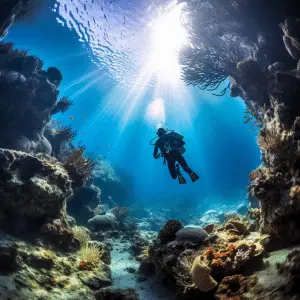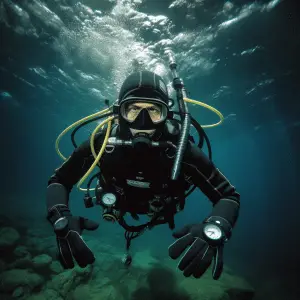Choosing the right dive destination is key. It should match your skill level for an enjoyable and safe experience. Choose a spot that offers the perfect mix of challenge and excitement. Consider factors such as location, water conditions, diving requirements, and available support systems.
Start by figuring out your skill level. Beginner divers should opt for calmer waters. Experienced divers may seek out more challenging spots.
Location is important. For beginners, it’s best to stay close to home. This way, you can focus on building experience without the added stress of long-distance travel.
Research the requirements needed for diving. Some spots may require certifications or experience levels due to dangerous conditions. Do your research ahead of time.
Evaluate the support systems. Beginners should look for dive schools with comprehensive training programs. Advanced divers might seek out knowledgeable guides to show hidden treasures.

Assessing Your Skill Level
Assessing your skill level is key when selecting a dive destination. Knowing your abilities is essential for a safe and enjoyable experience. Here’s how to determine your skill level before planning your next adventure.
Consider your previous diving experience, certification level, and comfort level underwater. Evaluating these can help you find a destination that suits you and offers growth. See the table below to better understand how skill levels relate to suitable dive destinations.
| Skill Level | Certification | Experience | Comfort Level |
|---|---|---|---|
| Beginner | Open Water Diver | Limited or no dives | Nervous or unsure |
| Intermediate | Advanced Open Water | Several dives | Moderate |
| Advanced | Rescue Diver | Extensive experience | Confident |
| Expert | Dive Master | Highly experienced | Fearless |
Now that you know how each skill level corresponds, make informed decisions about your dive destination. Ask dive centers or experts for recommendations based on your skill set.
Safety should always be top priority. Choose a location that aligns with your abilities instead of pushing yourself. Doing this will lead to a safer diving experience and more enjoyment.
Whether you’re a beginner or expert, evaluate your skill level before making dive plans. Don’t miss out on experiences tailored for you. Dive into the right destination and let the underwater world amaze you!
Researching Dive Destinations
Divers often face the challenge of picking a dive destination suitable for them. Here are some things to think about before planning your underwater adventure!
A comparison table can help you choose a dive destination. Look at:
- Water Temperature
- Visibility
- Diving Difficulty Level
- Marine Life Diversity
- Accessibility
For example:
| Dive Destination | Water Temperature | Visibility | Diving Difficulty Level | Marine Life Diversity | Accessibility |
|---|---|---|---|---|---|
| Maldives | 81°F (27°C) | Excellent | All levels | Rich | Good |
| Great Barrier Reef | 73°F (23°C) | Good | Beginner to advanced | Extensive | Easy |
| Red Sea | 77°F (25°C) | Excellent | All levels | Diverse | Convenient |
Also, research the safety measures and regulations in place at each dive site. Some places have rules about what equipment you can use or the max depth.
Pro Tip: Get advice from other divers or certified dive instructors who know the dive sites. Their advice can help you pick the best dive destination for your skill level and preferences.
Seeking Recommendations and Reviews
When selecting a dive destination that fits your level of expertise, asking experienced divers for both reviews and recommendations can be really useful. They can give you tips on the best spots, dive operators, and water conditions.
Here is a summary of some points to think about when seeking advice:
| Factors to Consider | Description |
|---|---|
| Dive Locations | Check out the best areas for your skill level. Some may offer more challenging dives while others may have shallow reefs for beginners. |
| Dive Operators | Search for reputable and dependable dive operators. Look at reviews to find out about their professionalism, safety standards, and quality of service. See if they work with all skill levels. |
| Water Conditions | Read reviews for info on the water conditions. This includes visibility, temperature, and currents. Make sure they match your comfort level and skills. |
| Marine Life Diversity | If you want to spot certain animals or ecosystems, look for places known for their diverse marine life. Reviews can help you find areas with unique underwater life. |
| Safety Precautions | Pay attention to reviews that talk about safety measures. This includes thorough equipment checks, emergency response plans, and adequate supervision. Choose destinations that prioritize safety. |
Everyone’s experience is different. What worked for someone may not be the best for you.
Pro Tip: When reading reviews, focus on those from divers of the same skill level as you. Their experiences will give you more accurate insights for your decision.
By taking recommendations and reviews into account, you can pick the dive destination that suits your skill level best. Have a great dive!
Consulting with Dive Centers or Instructors
Searching for a dive spot that suits your level? Consulting with dive pros can help. Here’s how they can assist:
- Expertise and Experience: Dive centers and instructors possess masses of knowledge and experience with different dive sites. They can suggest spots that fit your ability, ensuring a secure and fun experience.
- Assessing Certification: They can review your certification to identify appropriate dive sites. Whether you’re a beginner or an experienced diver, they’ll steer you in the right direction.
- Local Conditions: Dive pros know the local diving conditions well. They can advise on factors like temperature, visibility, currents, and marine life, helping you find a destination that’s perfect for you.
- Training Opportunities: If you want to gain new certifications or hone your skills, dive centers and instructors can point you to destinations with specialized training programs.
- Recommendations and Reviews: These experts have often dived in different places. They can suggest places based on their own experiences or guide you to online reviews from other divers.
Plus, consulting with dive centers or instructors gives you the chance to ask questions about certain destinations you are attracted to. With their advice and your own research and preferences, you’ll be ready to choose a great dive spot that matches your skill level. Enjoy your dive!
Fun fact: According to Scuba Diving Magazine’s annual readers’ survey, the three most popular international dive destinations in 2021 were Fiji, Indonesia, and the Maldives.
Choosing a Dive Destination
Research is key when selecting a dive destination that suits your skill level. Consider these crucial points:
- Visibility: Investigate water clarity in potential locations. Optimal visibility helps appreciate marine ecosystems.
- Marine Life Diversity: Look for destinations rich in biodiversity. Enjoy unique species, coral reefs, and landscapes.
- Weather: Check the weather patterns. Avoid peak storm seasons for safety and experience.
- Dive Operators: Make sure professionals are available. Get guidance and knowledge of local sites.
- Dive Sites: Choose a location with a variety of sites for different skill levels.
- Recommendations: Ask fellow divers or online communities for advice. Get tips on hidden gems.
Thorough research helps make an informed decision for an unforgettable diving experience.
Preparing for the Dive Trip
Want a safe, fun dive trip? Here’s a 3-step guide!
- Research the destination. Look for spots that match your skill level. Think about water conditions, depth, and marine life. Read reviews from experienced divers for more info.
- Check your gear. Make sure it fits the needs of your destination. Some places might need special equipment, like exposure protection in cold water or certifications.
- Stay fit and practice. Get physically fit before the trip. Practice diving techniques. Take refresher courses or extra training if needed.
Gather all the necessary info to have a smooth, enjoyable diving experience.
Did you know? Scuba Diving Magazine says Cozumel, Mexico is one of the top dive destinations for all skill levels. Its clear water and abundant marine life make it perfect.

Conclusion
Choosing a dive destination that suits your skill can be intimidating. But, with thought and research you can find the perfect spot!
First, evaluate your skills. Think about your certification level, how many dives you’ve done, and your comfortability in various underwater conditions.
Once you know your skill level, research potential dive destinations. Look for places with a variety of dive sites suitable for you. Some places have calm, shallow waters ideal for newbies, while others have deep dives for more experienced divers.
When deciding, consider the climate and water conditions. Some spots may have strong currents or poor visibility during certain times of the year, which may not be good for beginners. So, choose a suitable time to visit based on seasonal weather and underwater conditions.
Get advice from fellow divers or reliable diving organizations. They can suggest locations that fit your skill and offer unique exploration and marine life encounters.
Plus, Dive Magazine says the Great Barrier Reef in Australia is one of the top spots for experienced divers due to its diverse marine life and tough dive sites.
Frequently Asked Questions
1. What factors should I consider when choosing a dive destination?
When choosing a dive destination, it is important to consider factors such as your skill level, the type of diving you prefer, the water temperature, visibility, and the marine life in the area.
2. How do I determine my skill level?
Your skill level can be determined by the number of dives you have completed, your certification level, and your experience with different diving conditions. It is important to be honest about your abilities to ensure your safety and enjoyment during dives.
3. Can beginners go on diving trips?
Yes, beginners can go on diving trips, but it is important to choose destinations that offer diving suitable for beginners. Look for locations with calm waters, good visibility, and dive operators that provide beginner-friendly training and guidance.
4. Are there destinations specifically for advanced divers?
Yes, there are destinations that cater to advanced divers. These destinations often have challenging dive sites, such as deep wrecks or strong currents, and may require certifications or experience beyond basic open water diving.
5. How can I find dive operators or centers that suit my skill level?
You can find dive operators or centers that suit your skill level by researching online, reading reviews, and checking their certifications and affiliations. Reach out to them directly to inquire about the type of dives they offer and their experience in catering to divers of different skill levels.
6. Are there destinations that cater to all skill levels?
Yes, there are destinations that cater to divers of all skill levels. These destinations often have a variety of dive sites ranging from shallow and calm to more advanced, allowing divers of different skill levels to enjoy their trip together. Research and choose a destination that offers a range of diving opportunities.
